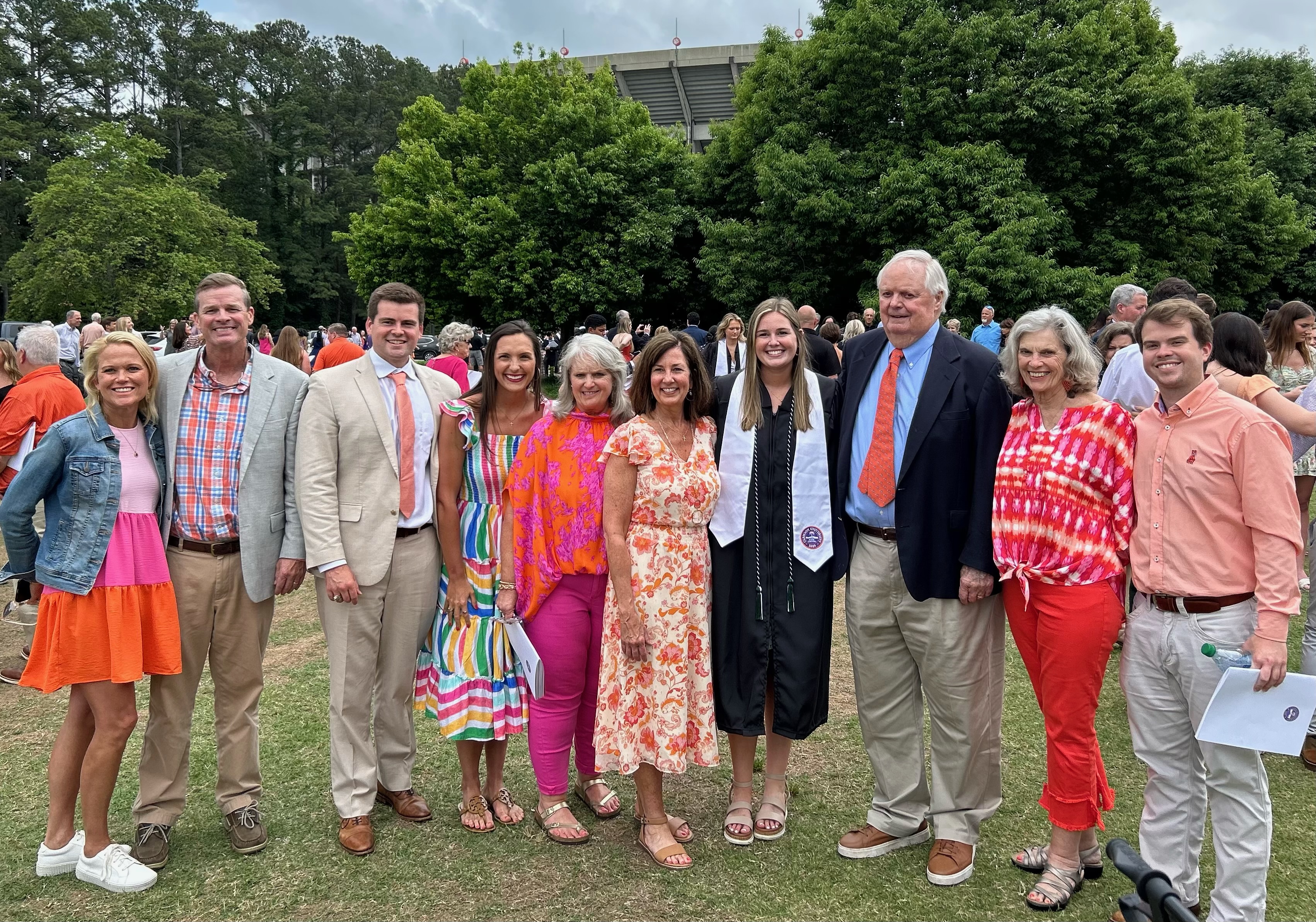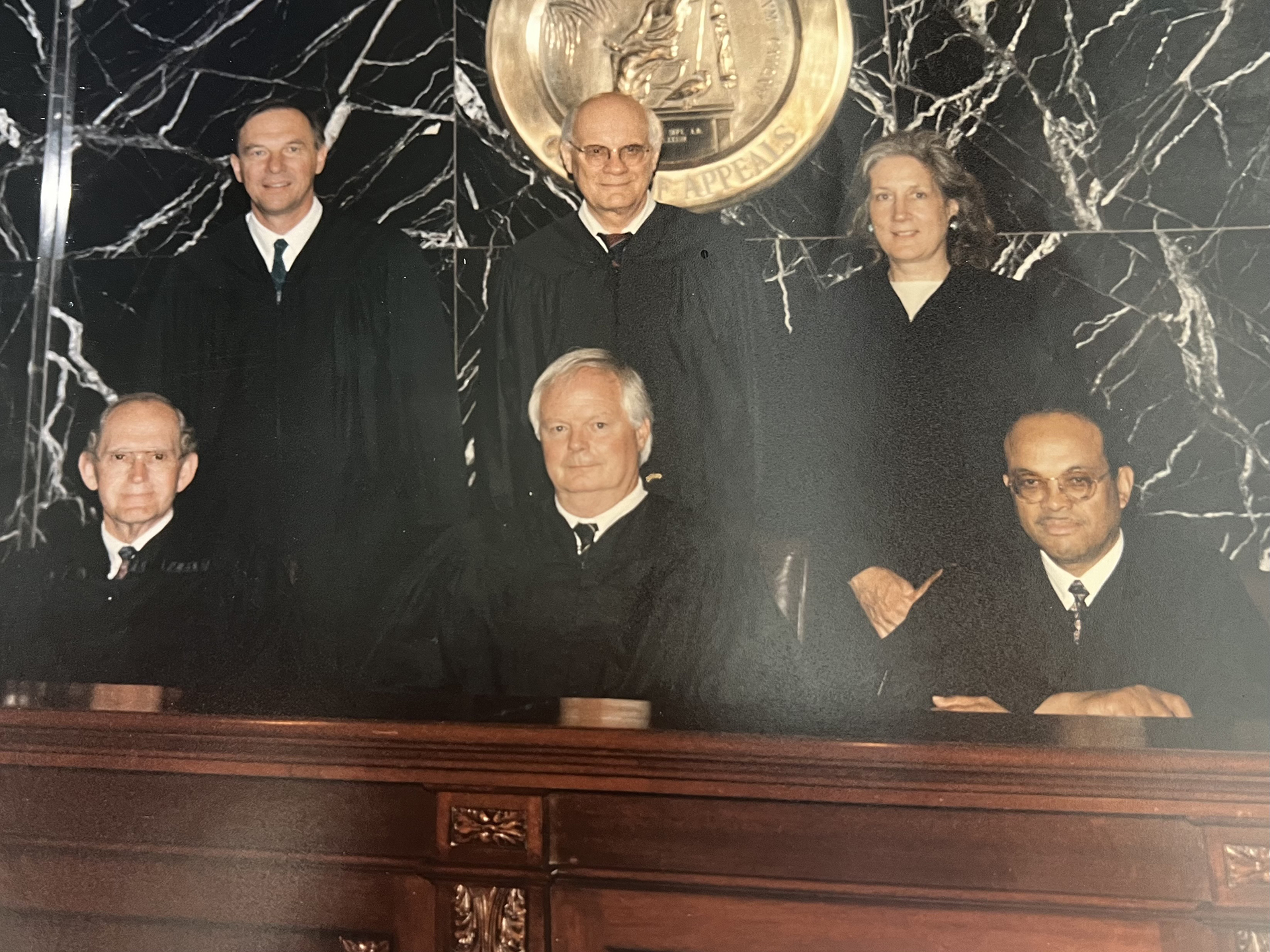The William T. Howell Pre-Law Society
Mission: The mission of The William T. Howell Pre-Law Society is to further educate Clemson Students about the process of applying to law school, the degree of dedication that law school entails, how to pay for law school, and the benefits of a Juris Doctorate degree. Furthermore, the William T. Howell Pre-Law Society is committed to creating and sustaining a unique environment promoting interaction between prospective law students and fostering prosperous relationships.
Contact Tim Garrison
Activities
The society regularly hosts events, including presentations and panels by practicing attorneys, judges, law school representatives, and current law students.
Along with serving as the University’s primary student organization for learning about law school and legal careers, the society provides like-minded students with a forum for discussion and fellowship.
For information about membership: howellsociety@gmail.com
Howell Pre-Law Society
About Judge William T. Howell
The William T. Howell Pre-Law Society at Clemson University was named in honor of Judge William “Bill” Tindall Howell. Judge Howell, now retired, was a highly regarded attorney, politician and jurist in South Carolina. He served as South Carolina Circuit Judge for the 14th District (1979–1992) and Chief Judge of the South Carolina Court of Appeals (1993–2000).

Judge Howell (third from right) with his family at Clemson University.
Early Life
Judge Howell was born on March 8, 1941, in Walterboro, South Carolina. His father, Madison Peyton Howell Sr., graduated from Clemson College and managed a family farm in Walterboro. Judge Howell credits his father for instilling in him a strong religious foundation, an appreciation for the feelings of others, regardless of their status, and the value of hard work. Despite being unexpectedly thrust into life on a farm, Howell’s mother, Carolyn Tindall Howell, raised four children and was always their greatest champion and defender.
There were few neighbors around the Howell farm, so family meals, especially the evening suppers, were some of Judge Howell’s fondest early memories. Television was nonexistent until his late teens, so he remembers that much of his childhood was spent listening to and participating in conversations among the adult family and the many visitors to his grandfather, who lived with them in the final years of his life. The topic of the day, whether politics, the law or community affairs, was always interesting to him. “There was,” he says, “a lot of front porch time.”
Howell attended Walterboro High School, where he played football and baseball. He also worked on the family farm while he was in school. He also secured a construction job during one summer in high school on Parris Island. He remembers being paid $1.10 per hour for his work. When he found some spare time from school, sports and work, he followed his pastimes of hunting and fishing on the Edisto River.
Education
After high school, Judge Howell enrolled at Clemson. He was awarded a prestigious fellowship from the Danforth Foundation, and in 1964 he received his bachelor's degree in animal husbandry. Judge Howell’s first job after graduation was as a county agent for the Clemson University Extension Service. When Judge Howell learned he would not be assigned as an agent in his home county, he left the extension service.
Howell says he is a farmer at heart and considered returning to the family farm. He was turned off the path of agriculture by his father. Howell concluded his father, a smart man, had a different destiny in mind for the young Clemson graduate: “He didn’t tell me that the farm was large enough to support only one family until after I had graduated from Clemson.” Because the business was not large enough to support two families, Howell’s father encouraged him to apply to law school. Judge Howell recalls, “I was having so much fun on the farm hunting, fishing and rag-tagging around. I think that’s why Daddy didn’t discourage me in agriculture until after I got my degree. I think that was the method of his madness.”
Howell understood that in pursuing a legal career, he would be following a rich family tradition. His grandfather and great-grandfather had practiced law in Walterboro, and his brother and brother-in-law would also end up with the bar. Howell entered the University of South Carolina School of Law and graduated cum laude and second in his class in 1967. Howell says that he enjoyed the challenge of law school and found the subject “a perfect fit” for his intellect and personality. While in law school, Howell also worked in the law library, served as a “runner” for a local law firm, and was employed at Fort Jackson, where he helped the paymaster distribute checks to new recruits. Judge Howell also experienced another life-changing event while in law school. He met Susan Gail Dooley, a student at Columbia College, on a blind date. They married and have been together ever since.
Law Practice and Political Career
After graduation, Howell, Gail and their newborn child returned to Walterboro to practice law. Howell soon formed a partnership with local attorneys Gerald Smoak and Lee Moody. He recalls that one of the first cases he tried on his own involved some farmer friends charged with planting peas to bait doves for hunting. Howell argued that the men were innocent and simply planting the peas for agricultural purposes. The magistrate judge, who was also a local mechanic, did not have legal training but was wise in managing the case. Judge Howell remembers that court was held around a pot-belly stove in the mechanic shop that kept the edge off the chill of the 14-degree weather outside: “When it came time to deliberate, instead of sending us outside, he sent the jury outside to deliberate,” Howell said. “We got a quick verdict in our favor that day.” “The deputy attorney general sent from Columbia to prosecute the case filed no motions in the case,” the judge laughed, “but simply asked for directions home.”
After years in a successful practice, Howell decided to enter politics. Even though he had never aspired to political office until that point, as with the law, his family had been engaged in public service for several generations. Howell noted his grandfather, who was forced into retirement at the Howell farm because of debilitating rheumatoid arthritis, was particularly influential in his decision to become a lawyer and ultimately run for office. His grandfather was deeply respected in the Walterboro area as an accomplished lawyer and served as chairman of the Democratic Party in the county for 30 years. In addition, Howell’s great-grandfather, George Gage, sat on the South Carolina Supreme Court, and his great-grandfather, M.P. Howell, who had also practiced law, served as a state senator.
In 1976, Howell was elected to the South Carolina Senate to represent the 15th District (which encompassed Allendale, Beaufort, Colleton, Hampton, and Jasper counties). He won the seat in a runoff, with Beaufort County providing the margin that enabled him to unseat veteran senator J.P. Harrelson, one of the senate’s so-called “Old Guard” who had controlled the legislature for years. Howell was one of only three nominees who defeated an “Old Guard” incumbent that year.
Judge Howell

Judge Howell (front, center) pictured with other judges of the South Carolina Court of Appeals
In 1979, Howell left the legislature to fulfill one of his lifelong dreams: He was elected by the state legislature to sit as a circuit judge at large, with statewide jurisdiction. His home circuit was one of the largest in the state, requiring him to hear cases in Beaufort, Colleton, Hampton, Jasper and Allendale counties. The appointment required Judge Howell to preside in his home circuit for six months and travel statewide for the remainder of the year. In his 14 years on the bench, Judge Howell heard hundreds of cases involving any number of subjects and personalities. He presided over more than a dozen death penalty cases and the state’s first spousal rape case. He was also the trial judge in the notorious Mary Lynne French trial, in which the 17-year-old French, the daughter of a Summerville police officer, was acquitted for the murder of Cottageville police chief Jerry Shelton.
Because the South Carolina Supreme Court caseload was so heavy, on May 19, 1983, the state senate approved legislation to provide for an interim appellate court to help clear the docket. In the November 1984 election, South Carolinians approved a referendum supporting a constitutional amendment to make the court a permanent institution. The state legislature quickly ratified the amendment, thus establishing the South Carolina Court of Appeals. At first, the new court functioned only to hear cases diverted from the Supreme Court; but in 1992, the Court of Appeals became an intermediate court of review, leaving appeals to the Supreme Court mostly discretionary.
In 1992, the General Assembly elected Howell as Chief Judge of the Court of Appeals. Judge Howell served on the bench until his retirement in 2000. He was then appointed chief mediator for the U.S. 4th Circuit Court of Appeals, which hears appeals from the nine federal district courts in Maryland, Virginia, West Virginia, North Carolina and South Carolina, and from federal administrative agencies. Howell continued in that post until his retirement in 2011.
Judge Howell and Gail, who worked as a schoolteacher, have been married since 1964. They have three adult children and reside in Walterboro. He now spends time with Gail, his grandchildren and great-grandchildren, and continues to hunt and fish in the Lowcountry. He remains a passionate supporter of Clemson students and all Clemson sports. The William T. Howell Pre-Law Society at Clemson is fortunate to have such a renowned patron and role model.
Biography written by Elizabeth Henderson '23, M '25

